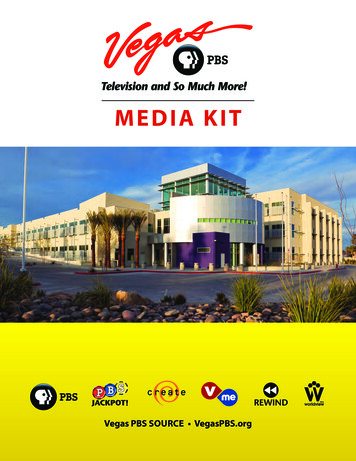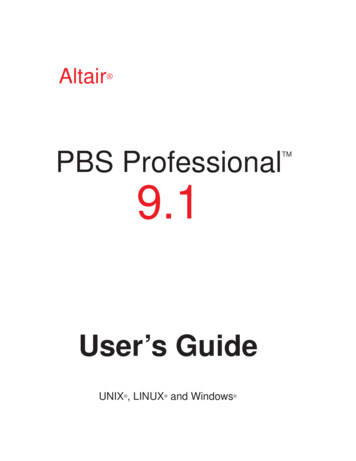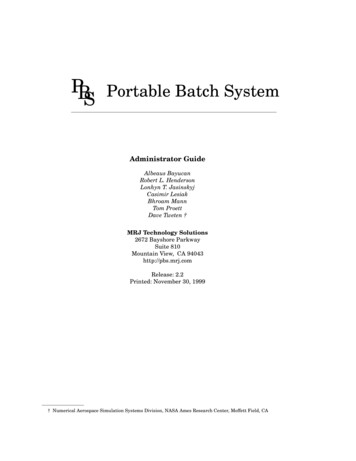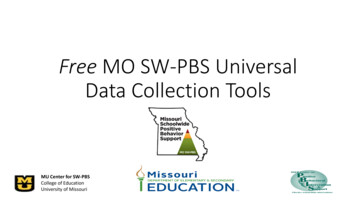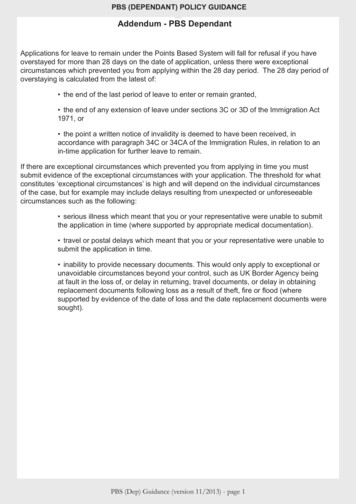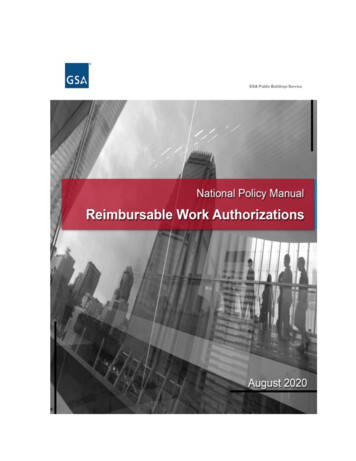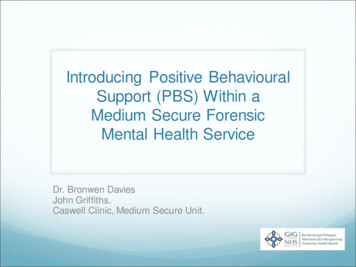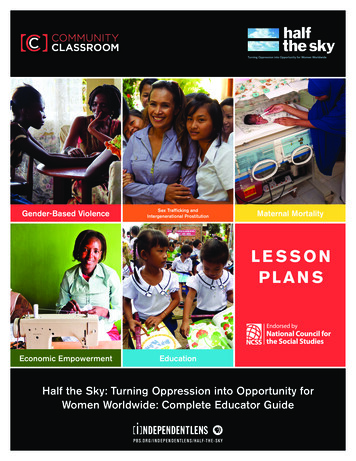
Transcription
Gender-Based ViolenceSex Trafficking andIntergenerational ProstitutionMaternal MortalityLE SSONPLAN SEconomic EmpowermentEducationHalf the Sky: Turning Oppression into Opportunity forWomen Worldwide: Complete Educator GuidePbs.org/independentlens/half-the-sky
Table of ContentsWelcome Letter01How to Use This Guide02About the Filmmakers03About the Curriculum Writer04About the Documentary05Lesson Plan Summaries08Film Module Summaries09 L E S S O N P L A N S :Maternal Mortality and The Global Health Divide10Education For All40Gender-Based Violence: Challenging Impunity58Breaking the Chains of Modern Slavery:Sex Trafficking and Intergenerational Prostitution79Women’s Economic Empowerment105Purchasing the Full-Length Film124Purchasing the Book124Credits125Independent Television Service (ITVS)651 Brannan Street, Ste. 410 San Francisco, CA 94107P: 415.356.8383 F: 415.356.8391Community Classroomclassroom@itvs.orgitvs.org/Educators
01Welcome to Community Classroom!The Half the Sky: Turning Oppression into Opportunity for Women Worldwide resourceyou have before you combines short film modules from the PBS documentary series withstandards-aligned lesson plans. It will give you everything you need to help older teens andyoung adults better understand why we believe the oppression of women and girls worldwide is the greatest moral challenge of our time.Through the stories of women acting as agents of change — from Vietnam to Somalia, Indiato Kenya — students will discover the work being done (and still left to be done) to reducematernal mortality, gender-based violence, and sex trafficking. They will learn how economicempowerment and education can break the cycle of poverty. These lesson plans alsoencourage young men to see how helping women and girls helps an entire community, andto take on an active role in making this happen.We hope you will join the thousands of teachers who have already tapped the growingWomen and Girls Lead resource collection offered by ITVS’s Community Classroom program. We hope this will help male and female students alike develop into engaged citizens,and we look forward to hearing stories of successes in your classrooms.Best of luck and thank you.Sincerely yours,Nicholas KristofSheryl WuDunn
02How to Use This GuideThis Educator Guide may be used to support viewing of the documentary film seriesHalf the Sky: Turning Oppression into Opportunity for Women Worldwide. The fivelesson plans contained in this guide are paired with specially edited ten-minute educational film modules adapted from the broadcast version of the film. The discussionquestions and activities are designed to engage mature students in discussions aboutsocial change and social justice, gender equity, civic engagement, organizing strategies, and the contributions of men and women to all of these issues. The activities canencourage students to learn and understand international struggles and take an activerole in addressing local concerns.Grade Levels:9-12, CollegeSubject Areas:Social Studies, Women’s Studies, Global Studies, Civics, Media Studies, EnglishLanguage Arts, Education Studies, Economics, Government, Political Science, PeaceStudies, Sociology, World History, Human Geography, Primary ResourcesSee individual lesson plans for additional subject areas.Lesson Plans:The activities target students at the upper high school level, but can be scaffolded toaccommodate the college classroom, as well as informal classrooms: after-school programs, clubs and youth training programs. All content aligns with national standards.Each of the activities is designed to last one traditional class period (50-60 minutes total,plus assignments), but include a variety of extensions that can deepen the learning astime permits. All activities aim to incorporate educational content and themes that can beintegrated into your existing curriculum.Film Modules:With this Educator Guide, you can build a unit around the entire documentary and/or oneor more of the Community Classroom film modules. The module lengths are noted, averaging ten minutes each.Stream the Film Modules Online:Community Classroom film modules are available in streaming video format atitvs.org/educators.Get the Film Modules on DVD:Educators may order free DVDs of Community Classroom film modules and activities atitvs.org/educators. DVD quantities are limited.COMMUNITY CLASSROOM strongly encourages educators to use this resource as acomplement to watching the full-length version of Half the Sky Turning Oppression intoOpportunity for Women Worldwide. Purchase information is included towards the end ofthis guide (see Table of Contents).
03About the FilmmakersMaro ChermayeffExecutive Producer and DirectorMaro Chermayeff is an award-winning filmmaker, producer, director, author and formertelevision executive at A&E/AETN. She is Founder and Chair of the MFA program inSocial Documentary at the School of Visual Arts in New York City and partner in theproduction company Show of Force. Some of her extensive credits include: 6x seriesCircus (PBS, 2010), Marina Abramovic: The Artist is Present (HBO, 2012), Mann v. Ford(HBO, 2011), Parasomnia (France 2, 2010), the Emmy Award-winning 10x series Carrier(PBS/Nat Geo International, 2008), the 6x series Frontier House (PBS, 2002), AmericanMasters: Julliard (PBS, 2003), The Kindness of Strangers (HBO, 1999), Role Reversal(A&E 2002), Trauma, Life in the ER (TLC, 2001), and over 15 specials for Charlie Rose.Represented by CAA, Chermayeff is a principal of Show of Force, the production entityfor the Half the Sky Movement. She is an Executive Producer of Half the Sky Movement’sFacebook Game and 3x Mobile Games with Games for Change.Mikaela BeardsleyExecutive Producer and NGO Videos DirectorWorking in close collaboration with the authors, Mikaela Beardsley originated the Half theSky: Turning Oppression into Opportunity for Women Worldwide project after producingthe Emmy-nominated Reporter, a film with Nicholas D. Kristof. She has worked in film andtelevision production since 1993, and has made films with Alex Gibney, Martin Scorseseand Wim Wenders. Beardsley began her television career at WGBH in Boston, andholds a B.A. in comparative literature from Princeton University.Jamie GordonExecutive ProducerJamie Gordon co-founded Fugitive Films in 2005. Her company produced Coach starringHugh Dancy and the comedy Wedding Daze starring Jason Biggs. Among other projects,she is developing Grlzradio, a TV project about girls’ empowerment. Previously, Gordonwas the Head of Development for GreeneStreet Films, working on In the Bedroom, andworked as a story editor for producer Wendy Finerman where she worked on ForrestGump. Gordon has produced independent features including swimfan, Pinero, ChicagoCab and Certain Guys. She graduated with a B.A. in history from Princeton University.Jeff DupreExecutive ProducerJeff Dupre has been producing and directing documentary films for over 15 years. Togetherwith Show of Force partner Maro Chermayeff, Dupre is director, creator and executiveproducer of Circus, a six-part documentary series that premiered on PBS. He conceivedand is producer and co-director of Marina Abramovi: The Artist is Present. He is a producer of Carrier and Michael Kantor’s Broadway: The American Musical. Dupre’s directorial debut, Out of the Past, won the Audience Award for Best Documentary at the 1998Sundance Film Festival, among other awards.
04About the Curriculum WriterAllison MilewskiAllison Milewski is an educator and curriculum designer with over ten years’ experiencein arts and media education. She has developed art integration programs, professionaldevelopment workshops, and arts and media curricula for organizations such as ITVS,Tribeca Film Institute, the Brooklyn Historical Society, and Urban Arts Partnership andmanaged arts-based enrichment programs for over 20 New York City public schools.Allison’s professional experience also includes over 15 years of program managementand administration with domestic and international NGOs such as PCI-Media Impact,the Center for Reproductive Rights, Goods for Good, and the Union Square Awardsfor Grassroots Activism. Allison is the Founder of PhotoForward, which she launched in2004 to empower young artists to tell their own stories through photography, visual arts,and creative writing and engage with their communities as citizen artists.
05About the DocumentaryIn 2006, Pulitzer Prize winning-journalists Nicholas Kristof and SherylWuDunn published a ground-breaking book about the oppression ofwomen and girls worldwide.That book was Half the Sky: Turning Oppression into Opportunity for WomenWorldwide — an instant bestseller that immediately catalyzed an already burgeoningmovement to eradicate gender inequality. The landmark PBS documentary series aims toamplify the central message of the book — that women are not the problem, but the solution — and to bolster the broad and growing movement for change. With the story of thebook and its impact as a launch pad, the film zeroes in on the lives of women and girls insome of the countries around the world where gender inequality is at its most extreme,and explores the very real ways in which their oppression can be turned to opportunity.Featuring six celebrated American actresses and the commentary of the world’s leading advocates for gender equality, Half the Sky: Turning Oppression into Opportunityfor Women Worldwide is a passionate call-to-arms — urging us to not only bear witnessto the plight of the world’s women, but to help to decisively transform their oppressioninto opportunity.Episode OneIn Episode One we follow Nicholas Kristof and three American actresses to developingcountries where gender-discrimination is at it’s most extreme. We explore the shockingextent of gender-based violence in Sierra Leone with Eva Mendes, the global crisis of sextrafficking as experienced by women and girls in Cambodia with Meg Ryan, and the needfor and power of educating girls in Vietnam with Gabrielle Union, where she visits aninnovative education program that is transforming, not only the lives of the country’s poorest and most vulnerable girls, but also the futures of their families and their communities.Featuring commentary from Sheryl WuDunn and interviews with some of the world’s leading advocates for gender equality — including Hillary Clinton, Michelle Bachelet, and GloriaSteinem — Half the Sky: Turning Oppression into Opportunity for Women Worldwide:Episode One offers a nuanced and moving account of this century’s most pressing problems, and an uplifting, actionable blueprint for changeGender-Based ViolenceOur first stop is Sierra Leone, a country recovering from years of colonial oppressionand a terrible civil war and which is still suffering from rampant gender-based violence.Guided by Amie Kandeh, the passionate and dedicated coordinator of the InternationalRescue Committee’s Women’s Protection and Empowerment Program, Nicholas Kristofand actress Eva Mendes come face-to-face with the enormous challenges women andgirls face in a country where rape is practically the norm — challenges embodied byFulamatu, a buoyant 14-year-old who hopes one day to become a bank manager. Whenwe meet Fulumatu she was raped repeatedly by a family friend and local church pastorwho is close enough to be officially considered her uncle. She had risked the shameof telling her parents and the ridicule of her community to break her silence and presscharges against the perpetrator. The outcome is a sobering object lesson in the insidiouseffects of gender-based violence, and the urgent need to end impunity for the violators.
06About the DocumentarySex TraffickingAs interviews with Sheryl WuDunn and some of the world’s leading advocates for gender equality explain, in many parts of theworld cultural attitudes and traditions are used to justify the lowstatus of girls, rendering them vulnerable to all manner of exploitation and abuse. This is nowhere more evident than in Cambodia,where the pernicious global problem of sex trafficking is perhapsat its worst. Actress Meg Ryan joins Nicholas in Phnom Penhas he catches up with Somaly Mam, one of the women profiledin the book Half the Sky — a woman who was herself a child sexslave and who now has dedicated her life to rescuing and rehabilitating others. As Somaly’s story merges and mingles with thoseof the girls in her charge, the horrors of sex trafficking are writlarge — so too is the awesome resilience of the human spirit andthe vast, untapped potential that resides in each and every one ofthe young women and children that Somaly’s programs support.Girl’s EducationThat potential, WuDunn and our luminary advocates tell us,is the key to bettering our world: tap into those girls and theywill change the future. The clarity of that equation, the elegantcause-and-effect of it, animates Episode One’s final sequence,in Vietnam, where former Microsoft executive John Wood’s organization Room to Read is transforming the lives of the country’spoorest and most vulnerable girls. Hosted by Bich Thi Vu, Directorof Room to Read’s Girl’s Education Program, Nicholas andactress Gabrielle Union get to know a few of the program’s starsand encounter firsthand the incredible obstacles which standbetween them and their bright futures. Still, these girls are almostmiraculously undaunted — and fiercely determined to change boththeir circumstances and those of their families. The ripple effectof their education even now is making itself felt — and there is nodoubt that with a little bit of help, a little encouragement and support, these girls and the tens of millions of others like them in thedeveloping world will be a powerful army for change.Combining vivid, visceral on-the-ground stories with the commentary of a vast and impressive roster of experts, advocates,and agents of change, Half the Sky: Turning Oppression intoOpportunity for Women Worldwide: Episode One takes us deepinto the lives of girls in the developing world and makes us witness to their seemingly impossible struggles — at once challengingand inspiring us to be a part of the vital, urgent project to empower them once and for all.Episode TwoEpisode Two continues our journey to the hot-spots of genderoppression around the world, and highlights the courageous workof some of the extraordinary women and men who are taking astand in the face of incredible odds. This episode focuses outattention on the role of women in their families and their communities — examining the fundamental obstacles that hinder their potential, and charting the ripple effect that results when that potentialis harnessedVeteran journalist and Half the Sky co-author Nicholas Kristofis once again accompanied by a three celebrated of Americanactresses who offer fresh and personal perspective on the issuesin each country. Kristof travels to Somaliland with Diana Lane toexamine maternal mortality and female genital mutilation; to Indiawith America Ferrera to explore intergenerational prostitution; and,with Olivia Wilde, to Kenya, where the transformative power ofwomen’s economic empowerment is changing women’s lives andis laying the groundwork for the next generation. In the process,the program considers the central role of women in the healthand stability of their families and communities, and establishestheir critical role in the global efforts to eradicate poverty andachieve peace. Featuring on-camera commentary from SherylWuDunn and some of the world’s most respected and outspokenadvocates for gender equality — including Melanne Verveer, ZainabSalbi, and Desmond Tutu — Half the Sky: Turning Oppressioninto Opportunity for Women Worldwide: Episode Two underscoresthe fundamental obstacles to women’s progress and prosperity, andcelebrates their boundless capacity to better our world.Maternal MortalityThe episode begins in Somaliland — an unrecognized country, populated mainly by nomads, where the average woman today hasa one-in-twelve chance of dying in childbirth. Joined by actressDiane Lane, Nicholas reconnects with Edna Adan, founder of theEdna Adan Maternity Hospital in Hargeisa. A spry 70-somethingwoman often and rightly described as a “force of nature,” Edna isalmost single-handedly revolutionizing the experience of childbirthin her country — providing medical care to women who would otherwise have none, training midwives, and fighting tirelessly againstfemale genital mutilation — a traditional practice, still common inmuch of Africa (and elsewhere), which severely compromises awoman’s ability to deliver a child. In Somaliland, the challengeswomen face in the developing world are starkly apparent: povertyand tradition conspire to undermine a woman’s health, directlythreatening her life, and having a lasting impact on her children’ssurvival and ability to thrive.
07About the DocumentaryIntergenerational ProstitutionAs Sheryl WuDunn and our cast of gender equality advocatesargues, tradition is, in many ways, the greater evil. In too manyplaces in the world, tradition still is used to marginalize women,to keep them down and in their place. This vicious cycle repeatsitself generation after generation, damaging and ending lives andundermining the ability of thousands of women improve theirquality of life and live their full potential. The key — as Nicholasand actress America Ferrera discover in India — is intervention bysomeone from the inside, someone in fact, very like Urmi Basu.A social worker and an educated, middle-class Bengali, Urmihas dedicated her life to stopping the cycle of intergenerationalprostitution in India, where 90 percent of girls born to sex workersfollow in their mother’s footsteps. What she is up against is neatlyillustrated by one of the young girls in her care, Monisha, who ison the brink of being wrenched out of school and likely sold to abrothel by her own family — a family that belongs to a sub-caste ofsex workers. What keeps Urmi going is girls like Sushmita — andmore to the point, women like Sushmita’s mother, Shoma, whohas lived the utter brutality and desolation of prostitution everyday of her life and desperately wants a different fate for herdaughter. Shoma’s hope for her child is the seed of real and lasting change.Economic EmpowermentWhen women have equal control over their finances and thefinancial decision-making on the personal, community, andnational level, everyone benefits. Sheryl WuDunn and the manycontributors who lent their voices and considerable expertise toHalf the Sky: Turning Oppression into Opportunity for WomenWorldwide all stress that putting money in the hands of a poorwoman changes everything. On their visit to Kenya, Nicholas andactress Olivia Wilde witness the impact of the economic empowerment of women first-hand. In this episode’s final segment, theyexplore the impact and challenges of microfinance and the waysii iis transforming the lives of women and those around them. Webegin with Jane Ngoiri, a former sex worker-turned-dressmakerwho is now able to send her four children to school, where theyare each at the top of their class, and end with Rebecca Lollosoli,a Samburu woman who built a safe haven for women on the slender thread of a jewelry-making business. Nicholas and Olivia seefor themselves the dramatic and tangible transformation that canbe set in motion by a woman with a little bit of money of her ownand a system of support to help her make the best use of herfinancial and personal resources. Replicate the experiment severalmillion times, and the world will be an entirely different place.The episode — and the series — ends with an urgent call to action,an invitation to the viewer to take up the central moral challengeof our time, and to join a movement that will tap the immensepotential represented by women to create a more peaceful andmore prosperous world for us all.
08Lesson Plan SummariesMaternal Mortality and The Global Health DivideMaternal mortality has been identified as a global crisis and thegreatest health inequity of the Twenty-first century. Ninety-ninepercent of deaths occur in developing countries with more thanhalf in sub-Saharan Africa and almost one-third in South Asia, buteven within industrialized countries there is a disparity betweenmaternal mortality rates for women in different communities. Ahigh maternal death rate indicates not only that a country’s healthcare system is inadequate, but also that the fundamental rights tolife and health for women are being violated.Through the lens of the maternal mortality crisis in Somaliland,students will examine the social, economic, and cultural factorsthat contribute to the differences in healthcare — both betweenand within countries, including the United States — and the importance of maternal health in their own communities.Gender-Based Violence: Challenging ImpunityViolence against women and girls is a global crisis that impactsmost communities regardless of race, class, country, religion, oreconomic status, but it often goes unreported and perpetratorsare rarely brought to justice. Factors such as fear of retribution,shame, stigma, lack of economic resources, inadequate socialservices, and ineffective legal systems impede women and girls’ability to access the legal and social supports they need. As aresult, survivors of violence are left vulnerable to further abusefrom the systems and institutions that are meant to protect them,and the perpetrators are often left unpunished and free to continue perpetrating violence.Students will follow the journey of Fulamatu, a fourteen-year oldrape survivor in Sierra Leone, as she bravely takes a stand andattempts to bring her perpetrator to justice. Through her story,students will examine the culture of impunity that enables genderbased violence to flourish, and the impact this issue has on ourown communities. Students will also be challenged to considerthe factors that contribute to violence against women and girls,and how they can contribute to local and international efforts toeradicate it.Education For AllAccess to education is recognized as a basic human right and asignificant factor in breaking the cycle of poverty and improvingquality of life for children, communities, and countries. Despite this,millions of girls and women around the world are disproportionatelydenied the opportunity to attend school and pursue education andtraining outside the home.Students will meet Nhi and Phung, two students in the Room toRead program in Vietnam, and learn about their struggles andsuccesses as they doggedly pursue their education against allthe odds. The activities in the lesson will also engage students ina conversation about the value and meaning of education in theirown lives and the impact of the gender imbalance in education onthe lives of individual girls around the world and our communitiesat home.Breaking The Chains Of Modern Slavery:Sex Trafficking and Intergenerational ProstitutionModern-day slavery is relatively unknown, in part, because itdoes not fit our historic image of slavery, but trafficking of humanbeings is tied with arms dealing as the second largest criminalindustry in the world. Contemporary human slavery can take manyforms, including forced labor, debt bondage, child marriage, andcommercial sexual slavery, and women and children constitutethe vast majority of the estimated two million people sold into sexslavery around the world every year.This lesson will examine the global trafficking crisis through thelens of sexual slavery in Cambodia and intergenerational prostitution in India. Through this lesson students will learn that there aremore people living in slavery today then at any time in history andconsider the causes and consequences for women and childrenwho are disproportionately victimized by the global commercialsex trade.Women’s Economic EmpowermentWomen and girls play a vital role in the economic prosperity oftheir families, communities, and countries, yet in every part of theworld, women often work longer hours than men, are paid lessfor their work, are at a higher risk of unemployment, and are farmore likely to live in poverty. A growing body of research showsthat enhancing women’s and girl’s economic opportunities playsa critical role in poverty reduction and helps to reduce genderbased discrimination and violence while improving women andgirls’ access to education and civic participation and raising thequality of life for future generations.This lesson will demonstrate how the economic empowerment ofwomen in Kenya and Liberia has improved the lives of the individualwomen and their families and communities for generations to come.Through the activities, students will explore what life is like formillions of people around the world and in the United States whoare struggling to live on two dollars a day, and what choices andsacrifices they would have to make in the same situation. They willalso consider how and why women and girls around the world aredisproportionately affected by extreme poverty and will examine theripple effects of women’s economic empowerment on individuals,families, communities, and societies.
09Film Module SummariesMaternal Mortality in Somaliland (9:45)The module begins in Somaliland — an unrecognized country,populated mainly by nomads, where the average woman todayhas a one-in-twelve chance of dying in childbirth. Joined byactress Diane Lane, Nicholas reconnects with Edna Adan,founder of the Edna Adan Maternity Hospital in Hargeisa. Ednais almost single-handedly revolutionizing the experience ofchildbirth in her country — providing medical care to women whowould otherwise have none, and training a new generation ofmidwives. In Somaliland, the challenges women face in thedeveloping world are starkly apparent: poverty and traditionconspire to undermine a woman’s health, directly threatening herlife, and having a lasting impact on her children’s survival andability to thrive.Gender-Based Violence in Sierra Leone (9:45)The module takes students to Sierra Leone, a country recovering from years of colonial oppression and a terrible civil warand which is still suffering from rampant gender-based violence.Guided by Amie Kandeh, the passionate and dedicated coordinator of the International Rescue Committee’s Women’s Protectionand Empowerment Program, Nicholas Kristof and actress EvaMendes come face-to-face with the enormous challengeswomen and girls face in a country where rape is practically thenorm — challenges embodied by Fulamatu, a buoyant 14-year-old.When we meet Fulumatu she was raped repeatedly by a familyfriend and local church pastor who is close enough to be officiallyconsidered her uncle. She had risked the shame of telling herparents and the ridicule of her community to break her silenceand press charges against the perpetrator. The outcome is asobering object lesson in the insidious effects of gender-basedviolence, and the urgent need to end impunity for the violators.Education in Vietnam (10:38)This module takes place in Vietnam, where former Microsoftexecutive John Wood’s organization Room to Read is transforming the lives of the country’s poorest and most vulnerablegirls. Hosted by Bich Thi Vu, Director of Room to Read’s Girl’sEducation Program, Nicholas and actress Gabrielle Union getto know two of the program’s stars and encounter firsthand theincredible obstacles which stand between them and their brightfutures. Still, these girls are almost miraculously undaunted — andfiercely determined to change both their circumstances and thoseof their families. The ripple effect of their education even now ismaking itself felt — and there is no doubt that with a little bit ofhelp, a little encouragement and support, these girls and the tensof millions of others like them in the developing world will be apowerful army for change.Intergenerational Prostitution in India (10:44)This module takes place in the slums of Kolkata, India, whereNicholas Kristoff travels with actress America Ferrera to meetUrmi Basu and to witness the work of her organization, NewLight Foundation. A social worker and an educated, middle-classBengali, Urmi has dedicated her life to stopping the cycle of intergenerational prostitution in India, where 90 percent of girls bornto sex workers follow in their mother’s footsteps. What keepsUrmi going is girls like Sushmita — and more to the point, womenlike Sushmita’s mother, Shoma, who has lived the utter brutalityand desolation of prostitution every day of her life and desperatelywants a different fate for her daughter. Shoma’s hope for her childis the seed of real and lasting change.Sex Trafficking in Cambodia (10:11)This module takes place in Cambodia, where the perniciousglobal problem of sex trafficking is perhaps at its worst. ActressMeg Ryan joins Nicholas Kristof in Phnom Penh as he catches upwith Somaly Mam — a woman who was herself a child sex slaveand who now has dedicated her life to rescuing and rehabilitatingothers. As Somaly’s story merges and mingles with those of thegirls in her charge, the horrors of sex trafficking are writ large — sotoo is the awesome resilience of the human spirit and the vast,untapped potential that resides in each and every one of theyoung women and children that Somaly’s programs support.Women’s Economic Empowerment in Kenya (10:41)This module takes students along for a visit to Kenya, NicholasKristof and actress Olivia Wilde witness the impact of the economicempowerment of women first-hand. They explore the impact andchallenges of microfinance and the ways it is transforming the livesof women and those around them. We meet Jane Ngoiri, a formersex worker-turned-dressmaker who is now able to send her fourchildren to school. Nicholas and Olivia see for themselves thedramatic and tangible transformation that can be set in motionby a woman with a little bit of money of her own and a systemof support to help her make the best use of he
(PBS/Nat Geo International, 2008), the 6x series Frontier House (PBS, 2002), American Masters: Julliard (PBS, 2003), The Kindness of Strangers (HBO, 1999), Role Reversal (A&E 2002), Trauma, Life in the ER (TLC, 2001), and over 15 specials for Charlie Rose. Represented by CAA, Chermayeff is a principal of Show of Force, the production entity


